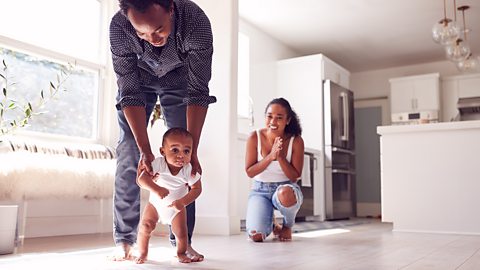If you could ask a Health Visitor anything about your child’s development, what would you ask?
A health visitor is a qualified nurse or midwife who has had extra training. They're there to help you, your family and your new baby stay healthy.
We have worked together with the to put together a bank of commonly asked questions and we hope that you will find this helpful.

General Questions
How often should my baby be weighed and measured?
The recommendation is that weight is measured only when your baby is seen routinely unless there are concerns.
Your health visitor may ask you to bring your baby more often if they wish to monitor them more closely.
Weighing your baby too often may cause unnecessary concern. The list below shows how often, as a maximum, babies should be weighed to monitor growth.
However, most children will not need to be weighed as often as this.
- 2-week-old to 6-months-old – No more than once a month
- 6-months-old to 12-months-old – No more than once every two months
- Over 12-months-old – No more than once every three months
This and other information about growth and monitoring is in .
How do you adjust milestones for premature babies?
Reaching developmental milestones may take a little longer for premature babies.
A preterm baby is born at less than 37 weeks’ gestation and needs to be assessed according to their corrected age. This is your baby’s age from your due date, rather than the day they were born.
Babies who are born prematurely may have extra checks depending on their needs and how premature they are.
My child hasn’t seen a health visitor. What have they missed?
Health visitors and their services were greatly affected due to the pandemic and, unfortunately, that means that some parents and children may have missed appointments.
If your child is due a health check or if you have any concerns about your baby – get in touch with your local health visiting team again and arrange for your baby to have a review. They will complete a full assessment of your baby and discuss any concerns or worries that you may have.
A one-year-old should have been offered the following Healthy Child Programme contacts:
- New birth visit (between 10-14 days)
- 6-8 week review
- One-year review
Your will also outline what health checks and immunisations your baby should have.
I’m worried about my child’s speech and language development
It’s completely natural to worry about your child’s language development. We spoke to some Speech and Language Therapists to answer any questions you might have.
Check out the links below for answers on the following topics:

Toilet training
How to start potty training?
Most children are ready to potty train between 18-months and 3-years.
Timing is crucial, so if you are about to move house or have a new baby, the timing might not be right.
If your child can follow instructions and let you know what they want or need, that could also be a sign of readiness. Your child needs to be physically ready too, so they’ll need to be able to sit themselves on the potty and be able to stand up when they’ve finished.
Other helpful signs are:
- they are aware that their nappy is wet/dirty (this doesn’t always happen with disposable nappies)
- they are aware that they are doing a wee or a poo
- they know that they need to do a wee or a poo
Read more of our top tips for potty training your toddler.
When should children be dry through the night?
Some children take time to be dry through the night, whilst others are dry from an early age.
It is generally accepted that some children don't wake up and wet themselves because they don’t pick up the bladder’s signal that it needs to empty, rather than because they're in a deep sleep.
Treatment is available for bedwetting and is recommended from the age of 5 years. You can find out more about .

Emotional Development
How do I deal with separation anxiety when kids go to nursery?
Separation anxiety is part of your baby or child developing their understanding of the world and their place within it.
Your nursery will be able to support you and your little one. They will build up the introduction period slowly to make sure that your baby or child feels safe and knows you will always come back.
Babies and children often like to have a key person who they can get to know and who they can be dropped off with each morning.Here are some top tips that may help:
- Say goodbye to your baby and tell them that you are coming back. Even though they may get upset, they will settle better and trust that you haven’t disappeared.
- Try to be calm and relaxed at nursery drop-offs. Allow plenty of time so you are not rushing.
- Let the nursery know if you feel your baby is not settling.
Read more on our website about dealing with separation anxiety in babies and toddlers.
How do I wean my baby off their dummy?
Dummies can be very soothing for young babies and, as they get older, they can become very attached.
It’s a good idea to wean babies off the dummy between 6-months-old and their first birthday so they can babble and speak their first words.
Setting limits on when your baby or child has their dummy, and sticking to it, is the first step.
Here are some more top tips:
- Give your child lots of praise when they don’t ask for a dummy (you can try a reward chart).
- Look for other things that might help when they want a dummy, such as their favourite toy.
- Be consistent and strong and you will get there!
The following link has lots of information about getting rid of dummies.
My child is scared of bath time! What do I do?
There can be a few reasons for this which may not be about the bath itself.
Have a think about bath time, what happens before and after? Is your child having to stop doing something they enjoy? Or is the bath followed by something they do not like?
Consider moving bath time to a time where it is more about fun and play, or let them bathe their toys instead. You can always give them a full body wash rather than a bath, while you're working this out.
Your local health visitor or GP will be able to offer you more specific help and support.
If you want to find out more about helping children with their fears.

Autism
From what age can you look for an autism diagnosis?
Children can be diagnosed with autism when they’re quite young, in some cases from the age of two years. But not everyone is diagnosed early in life.
It’s quite common for a child to not get their diagnosis until they are older, or even an adult, particularly if they don’t have accompanying learning disabilities.
Make an appointment with your GP or health visitor if you are worried about your child’s development.
Take along a list of behaviours and characteristics that make you think your child might be autistic. It could be useful to keep a behaviour diary leading up to any appointments after the referral.
Visit the to find out more about autism.
What are the signs of autism in a toddler?
Signs of autism in young children can include:
- not responding to their name
- avoiding eye contact
- not smiling when you smile at them
- getting very upset if they do not like a certain taste, smell, or sound
- repetitive movements, such as flapping their hands, flicking their fingers, or rocking their body
- not talking as much as other children
- repeating the same phrases
Young children develop at different rates. These behaviours may also simply reflect the age and stage of development of your child, so it is best to make an appointment with your GP or health visitor if you have any concerns.
Autism can sometimes be different in girls and boys. For example, autistic girls may be quieter, may hide their feelings and may appear to cope better with social situations.
This means autism can be harder to spot in girls.
These resources in the following link designed to help families of children with special educational needs or disabilities (SEND).






